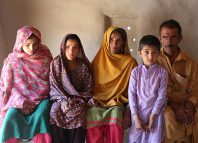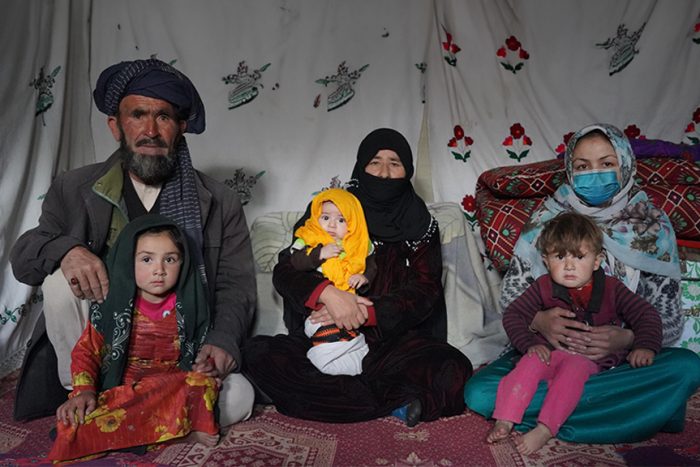A Ray of Hope: Humanitarian Aid Brings Relief to a Struggling Family
Ali Mohammad, a 79-year-old resident of a remote village in Bamyan’s Yakawlang 1 district, confronts the relentless challenge of sustaining his family of four: his wife, his nine-year-old grandson, his 35-year-old daughter, and himself. Despite his advanced age, Ali shoulders the immense responsibility of ensuring his family’s survival, dedicating himself tirelessly to their protection and well-being.
The tragedy in Ali’s life began with the loss of his sons, Ahmed* and Qurban*. In 2016, Ahmed, 24, was serving in the National Army of the Islamic Republic of Afghanistan when a roadside mine explosion killed him in Nangarhar province. At the time, his wife, Zainab*, was nine months pregnant with their first child, due any day.
After Ahmed’s death, Zainab was overwhelmed with immense grief, leading to severe complications, including heavy bleeding. Tragically, due to inadequate medical care, she passed away during childbirth at home, without professional supervision.
Ahmed’s son is now under the care of his grandfather. Despite their grim circumstances, Ali spares no effort in providing stability and support for his grandson, shouldering the responsibility with unwavering determination.
The family’s struggles, however, persisted. In 2022, Afghanistan’s deteriorating economy, coupled with a severe drought, led to a scarcity of job opportunities, deepening their plight. In a desperate bid to support his family, 23-year-old Qurban[1] traveled to Iran in search of work. Heartbreakingly, it has been 28 months since the family last heard from him, leaving them trapped in a painful state of uncertainty and anguish, unsure whether he is still alive
Meanwhile, Amina, Ali Mohammad’s 60-year-old wife, has been deeply affected by the loss of their son and daughter-in-law. She suffers from severe psychological issues, often waking in the middle of the night, crying and shouting. The family lacks the financial resources to seek proper treatment, leaving her to endure both mental anguish and severe foot pain. The trauma of losing her young son and daughter-in-law continues to haunt her every day.
Ali is left as the sole guardian of his grandson, wife, and daughter Ruqia. In their remote village, there are no employment opportunities for his daughter[2] who did not receive a formal education, and years of physical labour have left him unable to continue working. With no source of income, the family has fallen into poverty.
Ali explains, “I don’t know what to do without any source of income. I own 2.9 jeribs of land, but I can’t farm[3] it myself. Over time, I have sold 1.2 jeribs of land for AFN 160,000 (approx. USD 2,285) to cover my wife’s medication[4], my grandson’s education, and basic necessities like food for my family.”
He added, “Earlier, I used to borrow essential food and hygiene items from the Nayak Market—the district center market, 21 km away from my home. However, for the past seven to eight months, they have refused to lend me anything because they know I cannot repay it.”
Ali also voiced his growing concern, “I’m worried I might develop mental health issues myself. The harsh winter and the constant worry about providing food and medicine have taken a toll on my sleep.”
The family survives on a meager diet of wheat bread with tea, and occasionally potatoes or rice.
As a food-insecure family with no source of income, Ali’s household was identified as eligible for the Cash for Food program through a survey conducted by Community World Service Asia (CWSA) on November 27, 2024. For the first time in a long while, Ali felt hopeful upon learning he would receive five months of cash assistance.
On December 24, 2024, Ali received his first installment of AFN 2,804 (approximately USD 40). “With this assistance, I was able to purchase essential food items like flour, oil, sugar, salt, and rice. For the first time in a long while, we no longer have to worry about food,” he said.
He will receive four more installments over the next few months. With tears in his eyes, he expressed his heartfelt gratitude, stressing how this assistance would relieve his anxiety about feeding his family, at least for the time being. Supported by Presbyterian World Service & Development (PWS&D), this project aims to assist 3,810 households in Bamyan, Afghanistan, improving access to nutritious food for women, men, girls, and boys affected by the ongoing humanitarian crisis through five months of cash assistance.
[1] illegally
[2] His daughter is solely responsible for house chores and does not engage in any income-generating activities. Unlike the other women and girls in the village, who are involved in livestock and agricultural work alongside their household duties, she has no such opportunities as they do not own any livestock or have sufficient agricultural land.
[3] Ali and his son Qurban used to cultivate potatoes and wheat on the land earlier, but after Qurban, he is no longer able to do so. He used to earn around AFN 60,000 annually, but in recent years, he has struggled to make even AFN 40,000 due to the drought.
[4] She takes medication regularly, which her relatives purchase in Kabul based on her prescription and send to her. The monthly cost of the medication is approximately AFN 1,200 (equivalent to USD 16–20).







